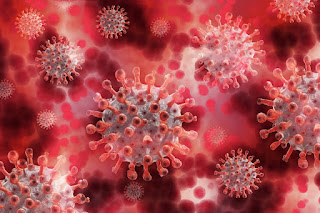 |
| cat |
Yes, like humans, cats also transmit viruses such as the new Corona.
 |
| "Covid 19" |
A recent study, posted in the "The New England Journal of Medicine" on May 13, showed that cats can easily be infected with the "SARS Cove 2" virus that reason"Covid 19", and even transmit contamination between them.
Just as the virus is transmitted between humans through contact with sneezing droplets and saliva, in accordance to the study conducted by scientists from the United States and Japan, cats additionally contract the virus after exposure to other people or cats carrying the “SARS-Cove 2” virus.
In an experiment, scientists uncovered three cats to the SARS-CoV-2 virus isolated from a human patient. The next day, they took a swab from the cats' nasal passages, which enabled them to detect the virus in two of the cats. On 1/3 day, they discovered the virus in the three cats.
To test the ability of these cats to transmit contamination between them, the scientists introduced a new cat into the cage of each of the first three cats.
The researchers took nasal and rectal swabs daily to decide whether new cats had the virus. Within two days, one of the new cats - which was not before infected - tested positive for the virus.
Within six days, all the cats had been infected with the virus, and positive results for the virus were regarded in nasal swabs only, without rectal swabs.
To test the ability of these cats to transmit contamination between them, the scientists introduced a new cat into the cage of each of the first three cats.
The researchers took nasal and rectal swabs daily to decide whether new cats had the virus. Within two days, one of the new cats - which was not before infected - tested positive for the virus.
Within six days, all the cats had been infected with the virus, and positive results for the virus were regarded in nasal swabs only, without rectal swabs.
The New England Journal of Medicine reports that cats can infect each different with the new coronavirus, but may not have any symptoms.
The record follows previous laboratory research and cases of home cats, as well as tigers and lions at The Bronx, New York Zoo, that has tested positive for the lethal coronavirus.
In many cases, these cats showed mild symptoms, but the six cats in the new scan did not get sick at all and expelled the virus from their bodies on their own.
Can cats get contaminated humans?
In the report, it was also pronounced that cats can catch the infection from humans, but there are no reviews of a person contracting the virus from a cat, although the authors suggest that the opportunity deserves further research.
And the US Department of Agriculture and the "Centers for Disease Control and Prevention" of the US Department of Health announced the registration of the first two cases of the rising coronavirus in the country for two pet cats.
The two official bodies stated that the two cats infected with the virus had "mild" symptoms, and they were expected to recover.
They are believed to have reduced in size the virus from people in the home they lived in or the neighborhood in New York City.
Health officers say some animals can catch the infection from humans, but there is no proof that animals transmit it to humans.
And it was recently announced that seven tigers and a lion have been infected at The Bronx Zoo in New York.
Two cats, one in Belgium and the other in China, and a dog in China examined positive for the emerging coronavirus, and experts consider that the three animals were most likely infected with the virus from their owners.
A new lookup revealed that cats may be more inclined to infection with the new coronavirus compared to other pets, and may additionally be able to spread it to other cats, in accordance to the “Business Insider” website.
Cat protection recommendations
Many institutions are currently working on growing special recommendations related to pets, particularly if they or their owners are exposed to “Covid 19” disease.
Sandra Newberry, director of the Preventive Medicine Program at the University of Wisconsin-Madison, confirms that "animal welfare organizations are working very tough in this current crisis to preserve human and animal bonds, as properly as to preserve pets with their owners."
"Of course, it is a difficult time for everyone, which makes human beings more in need of comfort and aid than ever before, which is what pets provide them with."
Therefore, the owners of these animals must “take them into account when planning and getting ready for emergencies, including providing food and medication supplies for a period of two weeks, as well as making ready to provide the necessary care for the animal if the need arises, and setting it in quarantine due to illness,” says the Assistant Dean for Clinical Affairs. At the same university, Ruthan Chun.

Comments
Post a Comment